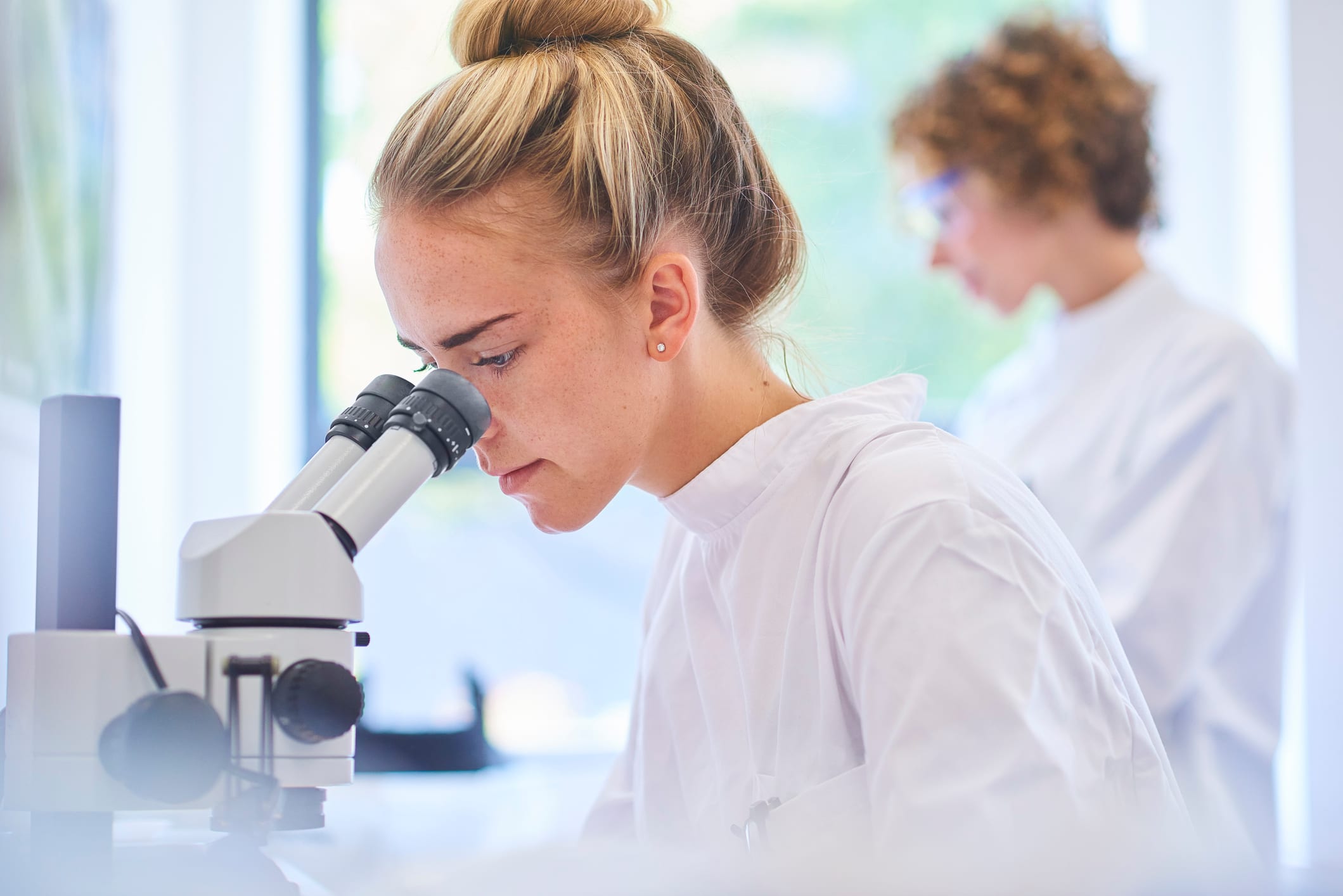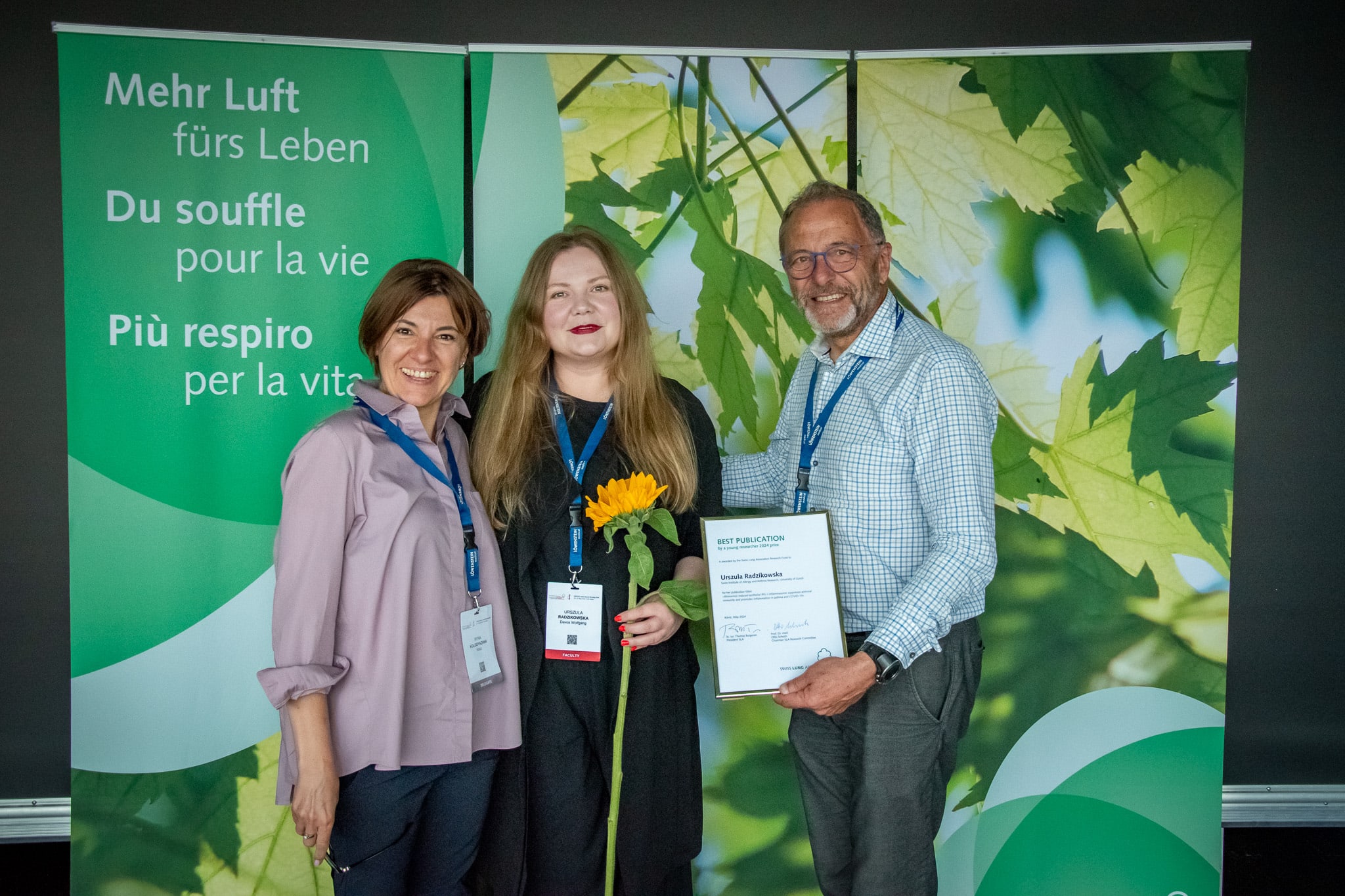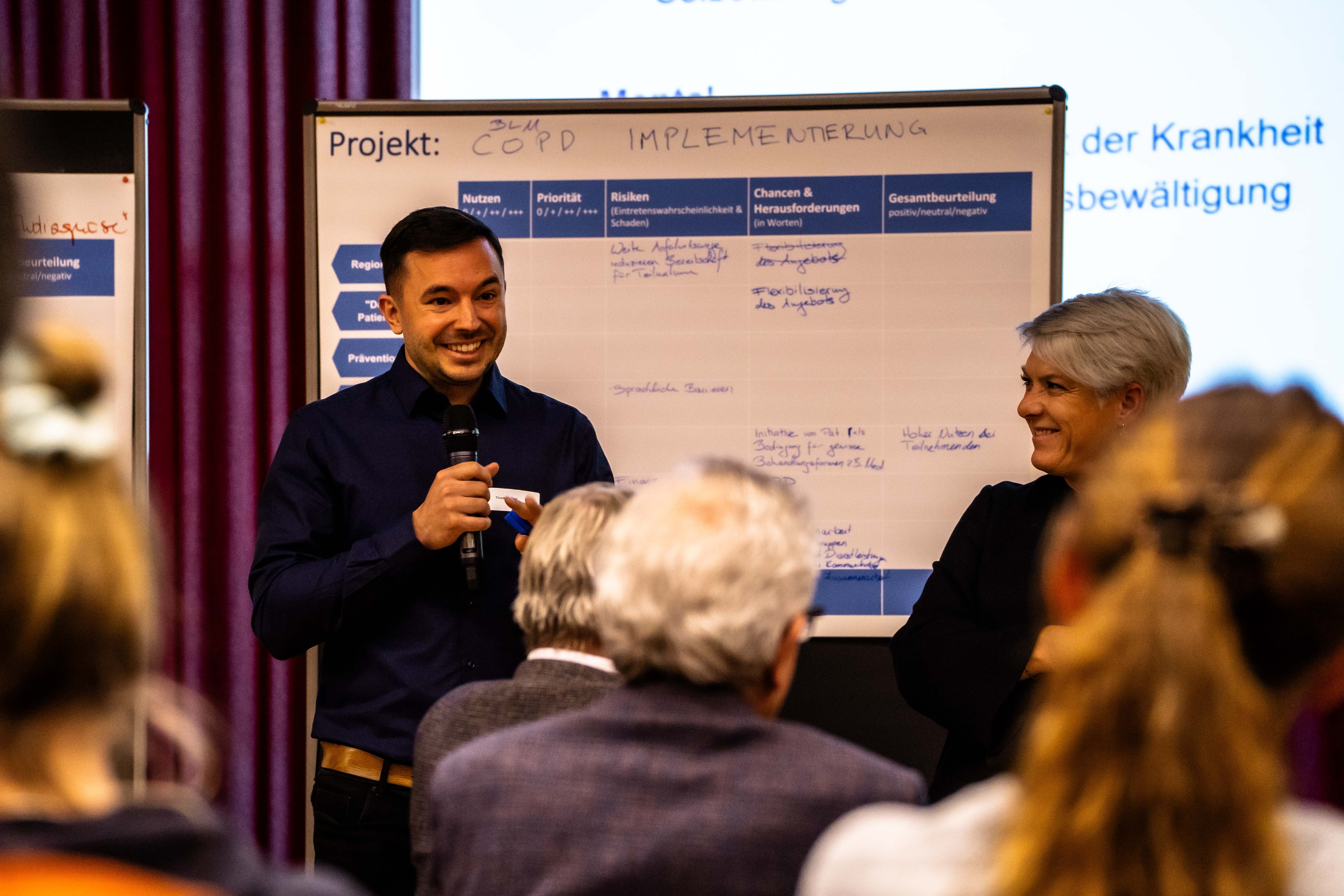

A propos du fonds de recherche
Historique
Un standard médical élevé, la stabilité politique et la renommée de la recherche universitaire constituent en Suisse une base très solide pour une recherche de haute qualité. Cela concerne en particulier des thématiques liées à la santé respiratoire, ce qui a entraîné la formation, dans des centres suisses, de groupes de recherche reconnus sur le plan international, dans le cadre universitaire et non universitaire. Il s'agit de prêter attention à la recherche compétitive dans le domaine de la santé des poumons et de lui assurer une base financière.
Globalement, les maladies pulmonaires sont en progression. La BPCO (broncho-pneumopathie chronique obstructive) est de nos jours la quatrième cause la plus fréquente de décès. On doit partir de l'idée que, d'ici à 2020, la BPCO avancera à la troisième place des causes les plus fréquentes de décès. Toutefois, avec l'allongement de l'espérance de vie, la fréquence d'autres maladies pulmonaires augmente également. Dans le cas de l'asthme bronchique, il a été possible, au cours des dernières années, d'optimiser le traitement grâce à une recherche innovante, de sorte que les patients peuvent maintenant bénéficier la plupart du temps d'une qualité de vie normale, avec une activité professionnelle et sociale entièrement préservée.
D'un autre côté, il n'existe toujours pas de traitement causal de l'asthme bronchique. On observe aussi continuellement des évolutions très graves sur lesquelles les formes thérapeutiques établies n'ont pas d'impact suffisant. Dans le domaine des maladies pulmonaires rares et malignes, des progrès ont aussi été réalisés au cours des dernières années, qui doivent être consolidés par la poursuite des recherches.
D'une façon générale, il y a donc des défis à relever dans le cadre de la recherche sur le poumon dans les domaines de la prévention, de la qualité de l'air, de l'épidémiologie, des sciences sociales, de l'économie de la santé et de la pneumologie clinique. Dans ces domaines, il est important de soutenir dans une même mesure la recherche expérimentale fondamentale et la recherche clinique appliquée.
Consciente de ces multiples défis, la Ligue pulmonaire suisse a créé en 2013 un fonds de recherche. Le fonds de recherche de la Ligue pulmonaire suisse a pour but de soutenir financièrement des activités de recherche qui revêtent une importance pour l'activité de la Ligue pulmonaire suisse et de ses membres et se situent dans le cadre de la prévention et du traitement de maladies pulmonaires et de troubles respiratoires.
Procédure
Le fonds de recherche met à disposition les deux procédures suivantes :
Dans les procédures ouvertes, des milieux de la recherche sont invités publiquement à soumettre un projet de recherche dans le cadre des maladies respiratoires, avec une liberté de choix des thèmes et de la méthodologie. La commission de recherche évalue les requêtes et prend finalement - en tenant compte du budget disponible du fonds – les décisions respectives d'attribution.
Dans les procédures sur des thèmes spécifiques, les milieux de la recherche sont invités publiquement à soumettre des projets de recherche sur l'un des points forts thématiques fixés par la Commission de pilotage. La commission de recherche évalue les requêtes et présente à la commission de contrôle les diverses demandes de subsides pour approbation définitive.
Qualité
Consciente de ces multiples défis, la Ligue pulmonaire suisse a créé en 2013 un fonds de recherche. Ce fonds est affecté à un usage bien défini et destiné à l'encouragement de la recherche dans le domaine de tâches de la LPS et de ses membres. A cet effet, la LPS, les ligues pulmonaires cantonales, la Société suisse de pneumologie (SSP) et la Société suisse de pneumologie pédiatrique (SSPP) travaillent en étroite collaboration.
L'attribution des subventions du fonds de recherche de la Ligue pulmonaire suisse est décidée par une commission de recherche extrêmement compétente composée des plus éminents pneumologues de Suisse.
Financement
Le Fonds d'encouragement de la recherche mis en place par la Ligue pulmonaire suisse en 2013 subventionne plusieurs projets de recherche par an. La commission de la recherche de haut vol décide quels projets de la recherche fondamentale expérimentale et de la recherche cliniquement appliquée seront subventionnés dans le domaine de la santé pulmonaire.
Le Fonds d'encouragement de la recherche est alimenté par la Ligue pulmonaire suisse ainsi que par les ligues cantonales qui versent une cotisation annuelle. Pour pouvoir garantir financièrement la réalisation des projets sélectionnés par la commission de recherche, la Ligue pulmonaire suisse a besoin de contributions d'encouragement. Aidez aussi la recherche, merci beaucoup !
Oui, je souhaite soutenir le fonds de recherche ou un projet de recherche spécifique.
Commission de recherche
L'attribution des subventions du fonds de recherche de la Ligue pulmonaire suisse est décidée par une commission de recherche extrêmement compétente composée des plus éminents pneumologues de Suisse.
- Prof. Dr. med. Otto Schoch, President of the Research Commission, Head of Pneumology and Sleep Medicine, Cantonal Hospital St. Gallen
- Prof. Dr. med. Dr. phil. Katrin Hostettler Haack, Vice President of the Research Commission, University Hospital Basel
- Dr. med. Grégory Berra, University Hospitals Geneva and University Hospital Lausanne
- Prof. Dr. med. Manuela Funke-Chambour, Inselspital and University of Bern
- PD Dr. med. PhD Thomas Gaisl, University Hospital Zürich, clinic for pneumology
- Dr. med. Angela Koutsokera, University Hospital Lausanne and University of Lausanne
- Prof. Dr. med Claudia Kuehni, University of Bern
- Prof. Dr. med. Philipp Latzin, Inselspital and University of Bern
- Prof. Dr. Joachim Marti, Unisanté, University of Lausanne
- Dr. med. Jean-Marie Schnyder, Director of the Lucerne Höhenklinik Montana
Projets subventionnés
2023
English only:
Regulation of Pulmonary GM-CSF in Homeostasis and in the Context of Allergic Airway Inflammation
Christoph Schneider, University of Zurich
Key messages:
Barrier tissues, such as the lung, comprise different myeloid cell types with diverse functions. The resident macrophage compartment in the alveoli, known as alveolar macrophages, emerges early during lung development in a process that is dependent on the cytokine GM-CSF. Other myeloid cells, called dendritic cells (DCs), also move into organs like the lungs and are constantly replenished from precursors in the bloodstream. DCs are particularly important in inducing certain types of immune responses by presenting antigens to T cells, including those derived from common allergens. Using elegant transgenic mouse models, our research identified new mechanisms of cell-cell interaction through GM-CSF in the lung, which link epithelial cell GM-CSF production, DCs, and allergic airway inflammation.
Cell specific targeted gene editing of hepatocytes for treatment of Alpha1 antitrypsin Deficiency
Tiziana Cremona, University of Bern
Key messages:
Alpha1 antitrypsin (AAT) deficiency, an autosomal codominant disease resulting from point mutations in the SERPINA1 gene, is associated with liver and lung diseases. Currently, treatment options are limited, highlighting a significant unmet need for drug development efforts to address the challenges associated with living with AATD. Our aim is to offer a system which allows for permanent gene correction for the treatment AATD. This can be achieved by gene editing, which holds immense potential for various applications. In medicine, it offers the promise of treating genetic disorders by correcting disease-causing mutations. It also enables the development of more precise and personalized therapies, known as precision medicine. Our approach involves the production of cell-specific extracellular vesicles (EVs), serving as a delivery system to target hepatocytes and deploy base editors. When the base editor is targeted to a specific region of the genome, the deaminase enzyme converts one base to another within a small window around the target site. Base editors offer several advantages over traditional gene editing techniques. They are more precise and have a lower risk of off-target effects since they do not induce double-strand breaks. Additionally, they can correct point mutations without introducing foreign DNA, making them suitable for therapeutic applications that aim to minimize genomic alterations. I am continuously working to improve the efficiency, specificity, and versatility of base editing technologies to expand their utility in gene therapy and develop a tool for precision medicine.
Targeting cytosolic DNA sensors cGAS/STING and AIM2 during lung ex vivo perfusion to reduce posttransplant allograft inflammation and damage
Jérôme Lugrin, Centre Hospitalier Universitaire Vaudois CHUV
Key messages:
The cGAS/STING system, which aims at the detection mislocalized DNA within the cells, is activated by prolonged exposition to a cold temperature. Activation of this system promotes inflammation and cell death. Using cellular and animal models, we identified that cold preservation of rat lungs and lung cells at 4°C activated cGAS/STING in conditions that mimic lung preservation before transplantation. Moreover, prolonged cold preservation triggered a particular type of cell death named necroptosis that was dependent on cGAS/STING. Therefore, we propose that targeting cGAS/STING during lung preservation might have beneficial effects on the quality of transplanted lungs by reducing inflammation and cell death.
2022
Unraveling the protective role of endothelial cell MAGI1 in lung fibrosis
Dr. Jimmy Stalin, University of Fribourg
Project description (in German)
Project description (in English)
Comparison of two modes of the insufflator/exsufflator technique in paediatric subjects with neuromuscular disease: a randomised multi-crossover trial
PD Dr. med. Thomas Riedel, University Children's Hospital, Inselspital
Project description (in German)
Project description (in English)
Linking the newly identified androglobin to pulmonary and tracheal ciliary function
Dr. Anna Keppner, University of Fribourg
Project description (in German)
Project description (in English)
Effect of a digital lifestyle intervention on health-related quality of life in patients with non-small cell lung cancer (NSCLC) after rehabilitation: a multicenter randomized controlled trial
Prof. Dr. sc. techn. habil. Kai-Uwe Schmitt, Bern University of Applied Sciences
Project description (in German)
Project description (in English)
Point-of-care ultrasound for the diagnosis and risk stratification of lower respiratory tract infections in TB endemic regions: a multicenter prospective cohort study
Dr. med. Dr. phil. Noémie Boillat-Blanco, Lausanne University Hospital (CHUV)
Project description (in German)
Project description (in English)
2021
Cell specific targeted gene editing of hepatocytes for treatment of Alpha1 antitrypsin deficiency
Dr. Tiziana Cremona, Universität Bern
Project description (in German)
Swiss registry of children with home respiratory support
Dr. Sophie Guérin, Universitätsspital Lausanne, CHUV
Project description (in German)
Project description (in French)
Targeting cytosolic DNA sensors cGAS/STING and AIM2 during lung ex vivo perfusion to reduce posttransplant allograft inflammation and damage
Dr. Jérôme Lugrin, Universitätsspital Lausanne, CHUV
Project description (in German)
Project description (in French)
Obstructive Sleep Apnea and the risk of COgnitive DEcline in the elderly population – The OSA-CODE study
Dr. Nicola Marchi, Universitätsspital Lausanne, CHUV
Project description (in German)
Project description (in French)
Project description (in Italian)
Phenotypes of primary ciliary dyskinesia and their association with genetic mutations and disease progression
Dr. Eva Sophie Lunde Pedersen, Universität Bern
Project description (in German)
Regulation of pulmonary GM-CSF in the context of allergic airway inflammation
Prof. Christoph Schneider, Universität Zürich
2020
Drug tolerance in chronic respiratory infections
Dr. Lucas Boeck, University Hospital Basel
Project description (in German)
Altitude-induced breathing, sleep and cognitive impairments in healthy individuals older than 40 years and effect of preventive acetazolamide. Randomized, placebo-controlled, double blind trial.
Dr. Michael Furian, University Hospital Zurich
Project accomplished (in German)
Efficacy of ready4life - a digital coaching program for addiction prevention among vocational school students in Switzerland
Dr. Severin Haug, University of Zurich
Project description (in German)
Effects of hypoxia on pulmonary hemodynamics at rest and during exercise – implications and therapeutic strategies for patients with COPD
Dr. Mona Lichtblau, University Hospital Zurich
Project description (in German)
A simplified method of twitch mouth pressure measurement for the diagnosis of diaphragmatic dysfunction
Dr. Georgia Mitropoulou, University Hospital Lausanne
Project description (in German)
Lung microbiome in obesity-associated asthma: cause or consequence?
Dr. Niki Ubags, University Hospital Lausanne
Project description (in German)
Effects of air pollution on lung function and lung growth in Swiss children
Dr. Jakob Usemann, University Children’s Hospital Zurich
2019
Role of alternative RNA splicing in the regulation of antiviral responses of the respiratory epithelium.
Dr. Marco Alves, University of Bern
Project accomplished (in German)
Predicting asthma attacks in Swiss children: a clinical cohort study.
Prof. Dr. med. Cristina Ardura-Garcia, University of Bern
Project description (in German)
Project description (in French)
Tailored intervention on nutrition and exercise for obstructive sleep apnea patients treated with CPAP: TINE STUDY
Dr. Mathieu Berger, University Hospital Lausanne
Project description (in German)
Project description (in French)
Establishing a Swiss National Lung Cancer Screening Program
Prof. Dr. med. Christophe von Garnier, University Hospital Lausanne
Project accomplished (in German)
Full project report (in English)
Patient-specific, stem-cell derived lung organoids - a step to precision medicine
Prof. Dr. Thomas Geiser, University Hospital Bern
Project description (in German)
Project description (in French)
CT-based radiomics texture signature for the prediction of drug response to nintedanib in experimental lung fibrosis
PD Dr. med. Britta Maurer, University Hospital of Zürich
2018
Effect of Hepatocyte growth factor on regulatory T cells in bleomycin injured rat lung.
Dr. Fabian Blank, University of Bern
Project accomplished (in German)
Lung microbiota signatures in the light of frailty in lung transplant recipients: bacteria-virus-host interactions from bench to bedside.
Dr. med. Angela Koutsokera, Lausanne University Hospital
Project accomplished (in German)
A genome wide screen for drug resistance and drug tolerance mechanisms in Mycobacterium abscessus - a pathogen referred to as «antibiotic nightmare».
Prof. Peter Sander, University of Zurich
Project accomplished (in German)
Project accomplished (in French)
Project accomplished (in Italian)
This project is supported by the Georg und Bertha Schwyzer-Winiker Stiftung
Comparative effects between electronic cigarette vapour and cigarette smoke on inflammation and wound healing in human gingival keratinocytes.
Prof. Patrick Schmidlin, University of Zurich
2017
A novel auto-regulatory mechanism causing drug resistance of airway wall remodelling and mitochondrial activity in asthma.
Dr. Michael Roth, University Hospital Basel
Project accomplished (in German)
Early life exposure to nicotine affects the repair capacity of lung in adult mice.
Prof. Dr. Constance Barazzone-Argiroffo, University Hospital of Geneva
Project accomplished (in German)
Assessment of novel therapeutic strategies for the treatment of allergic asthma.
Dr. Alexander Eggel, University of Bern
Project accomplished (in German)
This project is supported by the Uniscientia Stiftung
Fluctuation dynamics of biomarkerst o predict exacerbations in asthma: A stepping stone for early intervention.
Prof. Dr. med. Urs Frey, University Children's Hospital Basel
Project accomplished (in German)
Project accomplished (in French)
Project accomplished (in Italian)
Effect of a long-term home-based exercise training using minimal equipment vs. usual care in COPD patients: A multicentre randomized controlled trial.
Dr. Anja Frei, University of Zurich
Project accomplished (in German)
This project is supported by the Uranus Stiftung
Molecular regulation of innate lymphoid cell type 2 in lung disease.
Dr. Philippe Krebs, University of Bern
Project accomplished (in German)
This project is supported by the Stiftung Lindenhof
2016
Investigation into air transmission of highly pathogenic viruses.
Assoc. Ph.D. Stefan Kunz, Institute of Microbiology, University Hospital Lausanne
Project accomplished (in German)
The microenvironment of stem cells in the fibrotic lung – does it matter?
PD Dr. med. / Dr. phil. Nat. Katrin Hostettler Haack, Department of Biomedicine and Clinic of Respiratory Medicine, University Hospital Basel
Project accomplished (in German)
Integrated care of co-morbidities versus standard care after acute hypercapnic respiratory failure in the intensive care unit: A Randomized Controlled Trial
Dr. Dan Adler, Pneumology Department, University Hospital Geneva
Project description (in German)
Support by smartphone app and carbon monoxide self-monitoring for smoking cessation: A randomised controlled trial nested into the Swiss HIV Cohort Study
Prof. Dr. med Heiner Bucher, Basel Institute of Clinical Epidemiology and Biostatistics, University Hospital Basel
Project accomplished (in German)
Unravelling protective signalling pathways in acute lung injury using a novel lung-on-chip technology
PD Dr. med. Stefan Freigang, Institute of Pathology, University of Bern
Project accomplished (in German)
This project is supported by the Uniscientia Stiftung
Impact of a pharmaceutical care intervention to improve adherence of inhaled medication in asthma and COPD patients
Prof. Dr. med Jörg Leuppi, University Clinic of Medicine, Cantonal Hospital Baselland
2015
Reduction of corticosteroid use in outpatient treatment of exacerbated COPD – a randomized, double-blind, non-inferiority study
Prof. Dr. med. Jörg Leuppi, Hospital of Baselland
Project description (in German)
This project is supported by the Parrotia Stiftung
Obstructive Sleep Apnoea in Ehlers-Danlos Syndrome
Prof. Dr. med. Malcolm Kohler, Division of Pulmonology, University Hospital Zurich
Natural history of lung cancer in Switzerland and cost-effectiveness of low-dose computed tomography screening
Prof. Dr. med. PhD Milo Puhan, Epidemiology, Biostatistics and Prevention Institute (EBPI), University of Zurich
Project accomplished
This project is supported by the Spendenstiftung Bank Vontobel
Azithromycin for immunomodulatory treatment of idiopathic pulmonary fibrosis – a clinical trial
Dr. med. Funke-Chambour, Inselspital Bern, Department of Pulmonology
Project accomplished (in German)
This project is supported by the Stiftung Lindenhof
Congenital Cystic Adenomatoid Malformations, a translational study: a key to understand lung development in 2015?
MD PhD Isabelle Ruchonnet-Métrailler, Pathology and Immunology Department, Medical Faculty of Geneva
Project accomplished (in German)
This project is supported by the Fiona Stiftung and the Werner Geissberger Stiftung
Effects of chronic cigarette smoke exposure and pathogen infection on microbial colonization and emphysema in mice
DVM PhD / PD Dr. med.vet. Dr. phil. Charaf Benarafa, Theodor Kocher Institute, University of Bern
Project accomplished (in German)
Glycosaminoglycans as systemic markers for acute exacerbations in chronic obstructive pulmonary disease
Prof. Daiana Stolz, Clinic of Pulmonary Medicine and Respiratory Cell Research, University Hospital Basel


